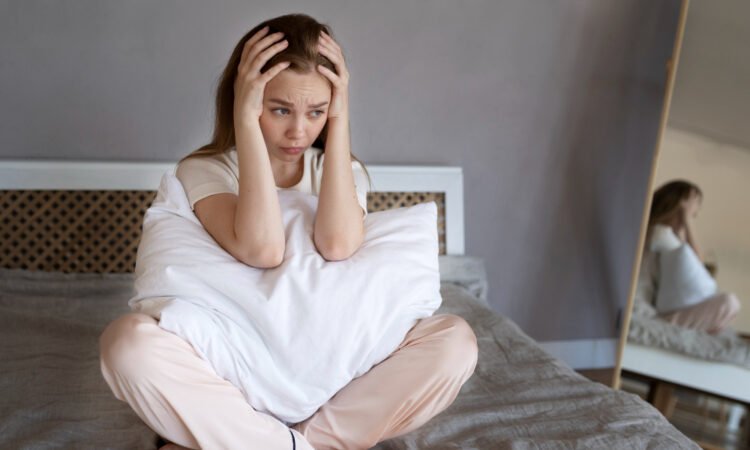
Here are 15 tips for managing anxiety without medication:
- Deep Breathing Exercises: Practice deep breathing techniques such as diaphragmatic breathing or the 4-7-8 technique to promote relaxation and calmness.
- Regular Exercise: Engage in regular physical activity such as walking, jogging, yoga, or swimming to reduce stress and release endorphins, which are natural mood lifters.
- Mindfulness Meditation: Incorporate mindfulness meditation into your daily routine to cultivate awareness of the present moment and reduce anxiety symptoms.
- Progressive Muscle Relaxation: Practice progressive muscle relaxation by systematically tensing and relaxing different muscle groups to relieve tension and promote relaxation.
- Limit Caffeine and Alcohol: Reduce or eliminate consumption of caffeine and alcohol, as they can exacerbate anxiety symptoms and interfere with sleep patterns.
- Healthy Diet: Eat a balanced diet rich in fruits, vegetables, whole grains, and lean proteins to support overall well-being and stabilize mood.
- Adequate Sleep: Prioritize getting enough sleep each night by maintaining a consistent sleep schedule and practicing good sleep hygiene habits.
- Limit Exposure to Stressors: Identify sources of stress in your life and develop strategies to minimize or cope with them effectively.
- Connect with Others: Seek social support from friends, family members, or support groups to share your feelings and experiences and receive encouragement.
- Set Realistic Goals: Break tasks into manageable steps and set realistic goals for yourself to avoid feeling overwhelmed and anxious.
- Journaling: Keep a journal to express your thoughts and emotions, track patterns in your anxiety symptoms, and identify triggers.
- Limit Screen Time: Reduce exposure to screens and digital devices, especially before bedtime, to promote relaxation and improve sleep quality.
- Engage in Hobbies: Participate in activities you enjoy, such as gardening, painting, or playing music, to distract yourself from anxious thoughts and foster a sense of fulfillment.
- Practice Gratitude: Cultivate gratitude by focusing on the positive aspects of your life and expressing appreciation for the things you have.
- Seek Professional Help: Consider therapy or counseling with a licensed mental health professional who can provide evidence-based techniques and support tailored to your individual needs.
These tips can help you manage anxiety symptoms and improve your overall well-being without relying on medication. However, it’s essential to consult with a healthcare professional if you have persistent or severe anxiety symptoms or if you’re considering making significant changes to your treatment approach.

It’s important to note that while certain vitamins and supplements may play a role in supporting mental health, there is no single vitamin that can cure anxiety on its own. However, some research suggests that deficiencies in certain vitamins and minerals may contribute to anxiety symptoms, and addressing these deficiencies through supplementation or dietary changes may help alleviate symptoms in some individuals. Here are a few vitamins and supplements that have been studied for their potential role in anxiety management:
- Vitamin D: Adequate levels of vitamin D have been associated with improved mood and reduced risk of anxiety and depression. Spending time outdoors and consuming vitamin D-rich foods such as fatty fish, fortified dairy products, and eggs can help maintain optimal levels. In cases of deficiency, vitamin D supplementation may be beneficial under the guidance of a healthcare professional.
- Omega-3 Fatty Acids: Omega-3 fatty acids, found in fatty fish, flaxseeds, chia seeds, and walnuts, have anti-inflammatory properties and may help reduce symptoms of anxiety. Consider incorporating omega-3-rich foods into your diet or taking fish oil supplements, although further research is needed to confirm their efficacy for anxiety treatment.
- Magnesium: Magnesium plays a crucial role in regulating neurotransmitters and may help modulate the body’s stress response. Foods rich in magnesium include nuts, seeds, leafy greens, and whole grains. Magnesium supplements may be beneficial for individuals with magnesium deficiency or those experiencing anxiety symptoms, but it’s essential to consult with a healthcare provider before starting supplementation.
- B Vitamins: B vitamins, particularly B6, B9 (folate), and B12, are involved in neurotransmitter synthesis and may play a role in mood regulation. Consuming a balanced diet that includes sources of B vitamins such as meat, fish, eggs, legumes, leafy greens, and fortified grains can help support overall mental health. In some cases, B vitamin supplements may be recommended for individuals with deficiencies.
While these vitamins and supplements may contribute to overall mental well-being and help manage anxiety symptoms, it’s crucial to approach their use with caution and consult with a healthcare professional before starting any new supplement regimen, especially if you’re already taking medications or have underlying health conditions. Additionally, addressing anxiety often requires a comprehensive approach that may include therapy, lifestyle modifications, and stress management techniques in addition to dietary changes and supplementation.




